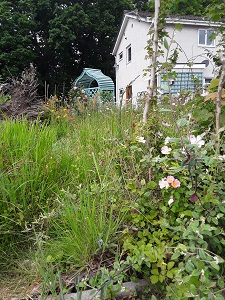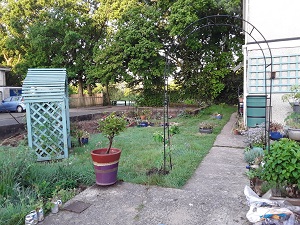Last week I asked colleagues to consider voting for the Hands Off Mangrove garden at the Royal Horticultural Society's Chelsea Flower Show. There was a great response, people were enthusiastic about the opportunity to show our support for both racial justice and re-forestation.
Probably none of us are surprised that the garden didn't win - and wasn't even in the top three. There is a long way to go before racial justice is a popular cause - particularly in places like the RHS Chelsea show. However, it was great to be able to discuss social issues in this elite context.
 I did laugh when I saw that the garden which won was the one that I admitted was my personal favourite - which I had set aside in the voting in order to support my political convictions. However this choice by so many other people made me think.
I did laugh when I saw that the garden which won was the one that I admitted was my personal favourite - which I had set aside in the voting in order to support my political convictions. However this choice by so many other people made me think.
The Perennial Garden: 'With Love', had won a silver medal, to the disappointment of its designer. Loose, wilder planting (including a beaver dam landscape) had been more highly favoured by the judges. Hands Off Mangrove, which will be relocated in inner city London, is about reclamation of an urban site with a loose informal mixture of flowers and edible plants and won a silver-gilt medal.
However, the Victorian formality and the romance of The Perennial Garden: 'With Love', was a big favourite among the visitors. Two couples even got permission to go into the garden and propose marriage under the Tennyson quote on the neon sign: If I had a flower for every time I thought of you. Unlike many of the large loosely planted garden sites, those of us with ordinary gardens to plan could see how we might take a section of the garden and replicate it, in even a small space. I myself liked the garden because it helped me realise that loose planting (which I generally favour), needs formal structure to support and contain it, otherwise it becomes messy, and that tall spires of white flowers will add depth and perspective to a flower bed.
 I have put aside a square of garden for loose wildflower planting, but in the rest of my garden I use arches and a trellised arbour seat to give a sense of structure.
I have put aside a square of garden for loose wildflower planting, but in the rest of my garden I use arches and a trellised arbour seat to give a sense of structure.

Richard Miers is not really looking back in a pastiche nostalgia. His garden has modern art installations as well as the formally clipped Victorian look. However I suspect that it was chosen by people who are looking backwards, in a time of great uncertainty about the future. The uncertainty we face is made even more difficult under a government which has been severely criticised for the way it manages the economy. Families on low incomes are under intense pressure, while ever more money appears to have flowed into the pockets of those already in the top 1% earners in the population. Policies which feed people's fears about Black, Asian and minority ethnic refugees and asylum-seekers, and by extension - UK citizens too, are used as a distraction from this poor record.
(This is why it is significant that Hands Off Mangrove was built at RHS Chelsea, showcasing the work of two Black gardeners. We had the chance to both think about issues of social and environmental justice, and to realise that Black - and Asian and other minority ethnic, people are not that exotic; we might be gardeners as well as political activists.)
Paul Gilroy has written about the phenomenon he calls 'postcolonial melancholia', originally in his After Empire and now in a book called Postcolonial Melancholia. This is an idea which adapts Freud's 'melancholia' - the state in which people fall when they are unable to let go of someone who has died, and properly mourn. Freud's argument is that people behave strangely in order to avoid acknowledging that death.
At a social level, Gilroy argues that many are in denial about the loss of empire and consequent descent of Britain from Greatness into ordinariness. This is evidenced in strange behaviour like chanting: "Two world wars, and one world cup," which English football fans would shout at German fans, or Brexit, or the constant cultural impression created by anti-immigration legislation that Britain is under threat from immigration, when in fact we depend on immigrant workers to keep vital services like the NHS going. (My students on DD102: Introducing the Social Sciences, are about to write an essay in which they could use evidence from the module about this.) Why would we want to shut hard-working people out of our country, instead of welcoming in help for our failing economy?
Historically, white working-class cultures and people get pitted against Black, Asian and minority ethnic cultures and people. Upper classes do not have to introduce economic management which redistributes to those on low incomes if they can identify a common enemy whom they encourage people to blame for problems like high unemployment. Tapping into nostalgia for an era when Britain was Great (conveniently forgetting that it wasn't particularly great for those in e.g. Manchester slums - again see DD102 material showing one of Engels's sketches of how factory workers' houses were laid out, without any gardens) takes people's attention away from the worrying problem of spiraling energy costs and food prices.
Are the Emperor's clothes starting to look skimpy even to those with postcolonial melancholic longings? While much of the population are still reliant on newspapers owned by the elite, which unsurprisingly continue to claim that it's the elite who are best placed to manage our economy, I am not confident we can soon move to a vote for social and environmental justice - in elections where this would not just be a symbolic vote. However, with a garden like Hands Off Mangrove built and shown on prime time television, so we can discuss its message openly, maybe we are slowly getting there.
What would I like to see in the future? Well, maybe a garden by someone like Cleve West that is formal and that showcases how much we have gained from the rest of the world: roses, lupins, peonies - all classic Victorian/Edwardian flowers featured in The Perennial Garden, and all immigrants from elsewhere in the world. Or a cottage garden that is not full of flowers and nostalgia: that shows clearly how 'cottage gardens' were for people who had to use whatever space they could find to grow food and medicinal herbs after they had finished a hard day's work. Maybe a garden that is a solitary auricula in a pot, like weavers used to keep because that was all the garden they could afford.
Comments
New comment
Thanks for another great blog. So thought provoking Anit. I love the link between gardens and social justice. I learn so much from your posts. Appreciate you writing and sharing.New comment
Awww, thank you Shona 🥰.